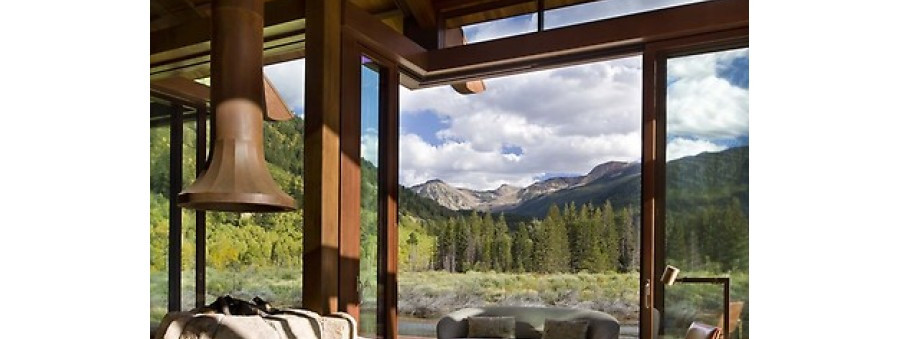9 Rules For Arranging Your Living Room


9 Rules For Arranging Your Living Room
Does your living room need a makeover? Just follow these rules to make the most out of this room.
Our living rooms are often the center of the party: we entertain, hold meetings, host parties, and lounge. Some homes have very formal spaces, others quite casual. Regardless of how you use your living room, follow these rules of thumb to make your furniture placement functional and beautiful.
1. Find The Focal Point
Is it your fireplace? The view outside? Most homes will have one focal point, and this doesn’t mean that all the furniture will face it. The focal point is what you want the eyes to find first upon entering the room; it’s the part of the room you want to show off. If your windows are low, like the living room below, choose furniture that has a low profile, so it doesn’t block the view.

2. Establish The Center Point
This isn’t necessarily the middle of the room but most of the time it will be. Generally, this is where the coffee table or center table should sit. If your home has a very long, or very large living room, consider having two center points, one will be larger than the other. In this living room arrangement, the first center point is where the glass coffee table is, the second one is near the windows.

3. Select The Seating
The “correct” furniture is whatever works best for your family. Some people love the idea of sofas so that there is potential for stretching out and lounging. Sofas create a more intimate seating arrangement as it forces people to sit next to each other. It also offers flexible seating, so you can squeeze more people into a room. Arm chairs, or side chairs, allow you to better control where individuals will sit and what direction they will face. Chairs can help break up space without being too large. The key is to find the balance between sofas (you may not have room for more than two) and individual chairs (you don’t want so many as to make your living room look like a hotel lobby). Shopping for furniture and not sure if it will fit in the room? Here’s a great trick: get the dimensions of the furniture and tape newspaper together in the size and shape of the furniture. Lay the newspaper down on your floor and you’ll be able to easily see if you have enough room to walk around the piece.
The key is to find the balance between sofas (you may not have room for more than two) and individual chairs (you don’t want so many as to make your living room look like a hotel lobby). Shopping for furniture and not sure if it will fit in the room? Here’s a great trick: get the dimensions of the furniture and tape newspaper together in the size and shape of the furniture. Lay the newspaper down on your floor and you’ll be able to easily see if you have enough room to walk around the piece (you’ll want about 30″ – 36″ of walkway between pieces).

4. Add Flat Surfaces
Don’t create a comfortable space and forget the side tables. Whether your living room is for formal occasions or everyday living, you’ll want to provide enough surfaces for people to place their drinks or other items down comfortably. The general rule of thumb is to place the coffee table within about 14″ – 18″ from the sofa; side tables may sit closer to the chair or sofa. How many you have is up to you. Try sitting in each seat and imagine trying to set down your coffee or magazine. If you are short on space but require lots of tables, try finding nesting tables that can be moved around when you have more people in the room but collapsed into one table when you aren’t entertaining.

5. Get The Right Size Of Everything
The most important rule to remember when designing your living room is balance. Large rooms can take large pieces, but not every piece should be large. Small rooms can withstand a large sofa however large sofas command large coffee tables, which will quickly fill the room. Use the newspaper trick (noted above) to move “furniture” around – it will help you decide between sizes before purchasing. Once you’ve established your sofa and chair sizes there are good guidelines to follow for “appropriate” table sizes. The coffee table should be about 1/2 – 2/3 the size of the sofa. Sofa tables (the console table that sits behind the sofa) should be no taller than the height of the back of the sofa and can be nearly the length of the sofa (allow at least 6 inches from either end of the sofa).
Side tables, or end tables, very often hold table lamps and decor, so their size will depend on how many items you need to place on the surface plus how much room you have in the space. Place them on the ends of a sofa or side chair and allow enough room for pass-through. Their height should be no taller than the height of the arm of the upholstered piece and no lower than the height of the seat; just make sure a person can easily set something down on the end table without it being awkward. Case goods, like armoires or credenzas, serve as storage pieces and space-fillers. If you need lots of storage in this room, select pieces that have closed doors for a cleaner look. If you want to show off your china, find a case good with glass doors to keep out the dust.

6. Add An Area Rug
If you need to select an area rug the general rule of thumb is to place the rug over the center of your room. Either place all the furniture on the rug or all the furniture off the rug. A larger rug will make the living area look larger, as you’ve visually expanded the center point. Laying down two or more rugs can work, especially if you prefer a more eclectic look, and so can placing the rug at an angle. Generally, speaking area rugs shouldn’t be closer than 6″ from the wall. If you have a large space and can’t use a standard-sized area rug, consider purchasing a carpet remnant. The supplier can create the exact size you need and bind the edges for a finished look.

7. Light Your Space
Properly lighting your living room means having light come from various sources and various positions. Directing your light source from the ceiling, table lamps, sconces and floor lamps will not only give you a balance of good lighting, it will allow you to change the feel of the room very quickly. Be sure to address the specific lighting needs of the room as well. If there is a favorite reading spot, then make sure a good floor lamp or table lamp is nearby. If you frequently entertain in this room, set your switches on dimmers to create flattering light. If you are having trouble finding the right type of lighting on your own, consider hiring a professional lighting specialist. Caution: having many lights may mean having many cords to trip over. Consider using double-sided, removable tape to hide cords behind furniture.

8. Be Flexible
If you truly have a multi-use living room, find pieces that can work in a variety of ways. Ottomans can be coffee tables or extra seating. Benches can store extra blankets and seat additional guests. Nesting tables can be spread out throughout the space when more surfaces are required. A sideboard can be an extra serving table or bar during a party.

9. Add Height With Wall Decor
Decorating the walls is usually left to the end and is nearly always a struggle for homeowners. Should you hang mirrors or artwork? Lots of small pictures or one giant one? Shelves or photos? Decorating the walls is important as it can create a sense of height and force the eye to travel around the room. Generally, mirrors, which will reflect light into the room and make the room feel larger, should be used sparingly in the room unless you want to create a statement piece (i.e. a grouping similar mirrors together or placed symmetrically like the photo above).
Remember that framed artwork with a glass front can also help reflect light into the space. Pieces hung on the wall, regardless of what they are, should generally be placed so that the center of the piece is at eye level (which is about 60″ – 65″ from the floor). Allow 6″ – 12″ of space between the edge of the piece and the ceiling or wall edge. Using the newspaper trick, you can create a template of your artwork by hanging newspaper in the same dimension of the art pieces and temporarily hang it on the wall using painter’s tape. Move the newspaper template around until you are happy with the arrangement.
Article Sources: http://porch.com/advice/10-rules-for-arranging-your-living-room/



_page20_image40-150x150h.jpg)












Leave a Comment